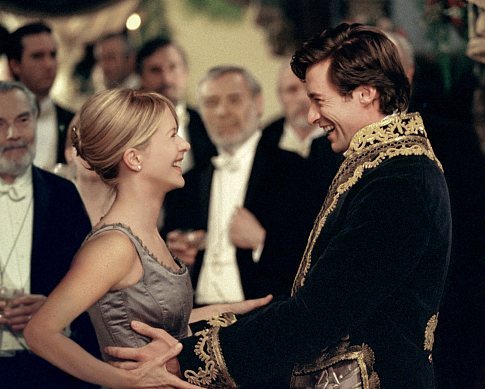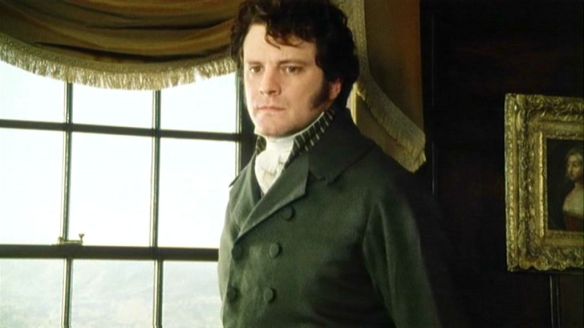by Lily Rae
I feel like I’ve been bludgeoned in the head with period dramas lately.
Despite being bombarded with sepia-filtered stuff like Call the Midwife, Downton Abbey, Mr Selfridge, The Paradise and god knows how many more sexually frustrated romps through a liberal definition of history for a good few months now, it only really hit home last night – when, for a reason known only to myself and Hugh Jackman’s eyebrows, I ended up watching sodding Kate and Leopold on Netflix.
From the perspective of the sane, Kate and Leopold is a total turd of a film. Kate (Meg Ryan) is a ~BUSINESS WOMAN~ who is totally miserable and coincidentally recently single. She’s massively successful and owns a glorious apartment in New York. Despite her success she’s mean and pathetic because we all know that a woman being actually fulfilled by her career is only a fairytale. Leopold (Hugh Jackman) is a cravatted babe from that period in history which inspired everyone to begin blog posts with ‘it is a truth universally acknowledged’. He’s also blessed with an accent that could, and does, melt pants purely by purring the phrase “fresh, creamery butter.” He jumps off a bridge and ends up in modern-day New York (obviously). It turns out Leopold is the archetypal gentleman; he stands up when you leave the table, he stampedes after a bag-thief on a white horse, he quotes Thucydides before kissing you – he’s totally perfect. Then there are non-sexual hijinks and he and Kate end up falling in love and she ABANDONS HER CAREER AND HER GLORIOUS NEW YORK APARTMENT and zips back in time to an era where she can’t even vote yet – but she does get Captain Butterpants. Wahey!
It’s even worse than it sounds.
So what does this period-rom-com-mutant-ninja-mess have to do with Proper Period Dramas? Well, for all its crap plot and bizarre messages about What Women Want, I felt compelled to sit up til 2am watching it – something I can’t bring myself to do with clever-people’s-telly like Downton Abbey and Parade’s End. There’s something more wholesome about Kate and Leopold than the critically acclaimed writing and proud-to-be-Britishness of all the BBC period dramas we’ve been chewing on recently –and it’s because, despite the silly plot and the awful writing, Kate and Leopold does not want to give the British Empire a blowie – in fact, it makes fun of it – and is not obsessed with the ludicrously rich and posh. It’s a crap love story and it sure as hell isn’t pretending to be anything else. (Although it would have made more sense to keep Leopold in the present – then Kate could have her job and her boyfriend without having to deal with a century of gender discrimination.)
But British period dramas? Mr Selfridge, The Paradise, Call the Midwife, Blandings, Upstairs Downstairs, the aforementioned Parade’s End and Downton Abbey – I just don’t get the fuss.
There are stately homes, lavish jewellery and costumes, plummy English accents, servants that sound like Catherine Tate, Fallen Women, characters called ‘Chummy’ who say things like “top hole!” and “back in time for Horlicks!” and above all a totally freakish obsession with hierarchy and wealth. There’s always so much money and so little action and once, just once, I’d really like to see something successful and groundbreaking that wasn’t set in ye olden days. Class is a painful and overdone topic, sucked of its importance by virtue of being only ever discussed by the people who lurk around on Comment is Free – and it’s all very well to talk about the working classes Back In Them Days, and giggle over the plucky little servants, but they’re totally unwilling to engage with what’s going on today, or in the future, like Black Mirror and Misfits did. It’s not bad TV – it’s just than no-one ever slates it because’s usually a literary adaptation and has posh accents.
image: the mirror.co.uk because everyone lives like this in the UK.
It’s the same with vintage fashion, the worldwide obsession with Mr Darcy, and the resurgence of *dry-heave* cupcakes and tea parties. It’s like we’re making the British Empire trendy again without really acknowledging it, or at least admitting that we’re totally wet for wealth. Ladies wearing pretty frocks and not having rights and stuff. Men being dark, brooding bastards. Poor plain ladies being hopelessly in love with Captain Butterpants and then just ousted in favour of Meg Ryan. Have we all conveniently forgotten that, for the majority of people, life back then was shit?
British period dramas seem to neglect the abject miseries of history, like fighting for rights and revolutions and war and suffering, and focus instead on trying to make a certain era in British history seem cutesy and nostalgic. It’s totally about NATIONAL PRIDE (which is creepy in itself), which you can only have in a suit or a pretty frock, and it takes itself so incredibly seriously. At least Kate and Leopold made fun of that ludicrous Austen-ideal by having jokes about poo and being generally rubbish.
Which brings me neatly onto the next thing. THE MEN.
Of course they’re just called ‘period dramas’ because they’re set in different periods of history (in this case, either the romantic period or the bloody late 19th and early 20th centuries). Still, I can’t help but think that the term ‘period drama’ is so called because it’s something you supposedly cry at when you’re on your period. Frequently disappointed by the graceless, charmless, oversexed lads of today, heterosexual women’s needs are, in theory, better served by fictional characters. Fictional male characters can be whatever you want them to be. They don’t have bands or meetings or appointments at the clinic. Instead they’re intense and passionate, the fire of their ardour only suppressed by the stifling influence of their cravats. They gaze into your eyes and recite poetry and drag the good name of their family through the mud just to be with you. Part of me wants to vomit, but another part of me wants to kick down the door and drag Leopold by the hair to pastures green and sexy.
I can only assume that period dramas are written with a specific type of woman in mind. I don’t think it’s particularly inaccurate to suggest that Leopold is a ludicrous caricature of the ideal man – he’s well spoken, he appreciates Da Arts, he’s handsome, sophisticated, quiet and dignified – he’s basically just a nice guy. Mr Darcy without the sulk, Heathcliff without the psychotic episodes. However, what makes all these men the same is that they’re fabulously wealthy and fabulously sophisticated. Here is a man who, once you’ve tamed him, (because it’s always a good idea to suggest to women that they can change someone with abusive tendencies) will keep you in pretty frocks and longing glances for the rest of your life.
In a sense, then, period dramas are more about the girl ‘getting the guy’ than the other way around. Which is good. Women aren’t rewards anymore and they will take what they want – unfortunately, he’s always a vile Tory bastard, and they have to literally wear down the grumpy, belligerent aristocrat to get him to admit that he loves her. After he marries her, and they’ve sorted out a dowry (which an entire episode will be devoted to), she’ll just become a sweet little wife. Dreams achieved, ambitions met. Hurk.
I don’t have anything against historical drama, but there’s a lot that gets conveniently left out in favour of insipid romances and boring family discussions about money purely because British history has to be something you can ‘snuggle up in front of’. Am I lowbrow for finding British period largely dull, passive, repetitive, and totally happy to ignore interesting things in favour of primness and chastity? You finish watching one and are desperate for someone to die or have sex or turn into a lion or start playing a banjo – anything that doesn’t involve talking about who’s going to inherit a colossal fortune. Remember Tipping the Velvet? That had lesbians in! And not just lesbians – lesbian sex! It was raunchy! It was fun! It was about a working class girl from Whitstable! Leave the toffs alone and come and hang out with the oyster girls!
My other half complained the other day that there wasn’t anything in a period drama that might cater to a ‘man’s interests’. Well, sir. As a female with interests outside of eligible bachelors, babies and frocks, there’s not much in it there that interests me either.



You must be logged in to post a comment.